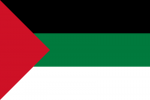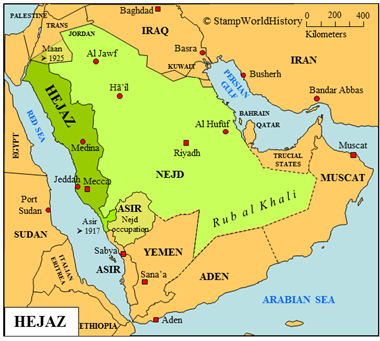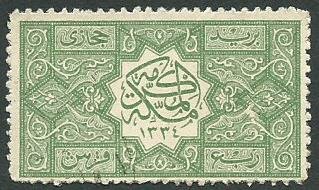الحجاز

Hejaz
Quick reference
General issues: Kingdom 1916-1925
Country name on general issues: Hejaz in Arabic script
Special issues: Local issues Mecca 1921-1922
Currency: 1 Piaster = 40 Para
Population: 850 000 in 1920
Political history Hejaz
Hejaz is located on the Arabian Peninsula in western Asia. Hejaz, until the early 20th century, is part of the Ottoman Empire. A complex political situation existed where Hejaz was ruled as the Ottoman vilayet – province of Hejaz and, at the same time, by the sharif of the sharifate of Mecca who had a large degree of autonomy in ruling the same territory.[1]The sharif of Mecca was the protector of the holy cities of Mecca and Medina. As in WWI, the Ottoman Empire loses control over its possessions in the Middle East, the sharif of Mecca, in 1916, proclaims the independence of Hejaz as the kingdom of Hejaz. In the south, Hejaz gains territory from Asir in 1917.[2]Asir was an emirate to the south of Hejaz that had proclaimed independence from the Ottoman Empire in 1914. In the north, the borders are adjusted in 1925, Hejaz and Nejd ceding the Maan district to Transjordan[3]The current Jordan. . The rising power in the region, however, is Nejd which was established in 1902, and since then expanded across the Arabian peninsula. In 1925, Hejaz is occupied by Nejd and in 1926 the sultan of Nejd is crowned king of Hejaz in personal union. In 1927, Hejaz is fully integrated into Nejd as the sultan of Nejd is crowned king of the united kingdom of Nejd and Hejaz. Nejd in 1932 is renamed Saudi Arabia. The most important cities in Islam – Mecca and Medina – lie within the borders of Hejaz. Jeddah – the port of Mecca – is at the time the largest port on the Red Sea.
Postal history Hejaz
In Hejaz, until 1916, Turkish stamps are used. The first stamps issued by Hejaz are definitives issued in 1916. Hejaz has issued many overprints. Control overprints reading, for example, ‘The Hejaz Goverment’ and overprints reflecting political events in the country, such as the assumption of the caliphate by the king of Hejaz in 1924 reading ‘In commemoration of the Caliphate’.[4]The caliph is the leader of all Muslims. The differences in the way catalogs list the issues of Hejaz may suggest that it is still, to a certain extent, a field of study for the editors of the catalogs also. Michel lists local issues for Mecca for 1921 and 1922, these being overprints on previous Hejaz issues. In 1925, the stamps of Hejaz are superseded by stamps issued by the Nejd government and in 1932 by those of Saudi Arabia.
Album pages
← Previous page: GeorgiaNext page: Hong Kong →



